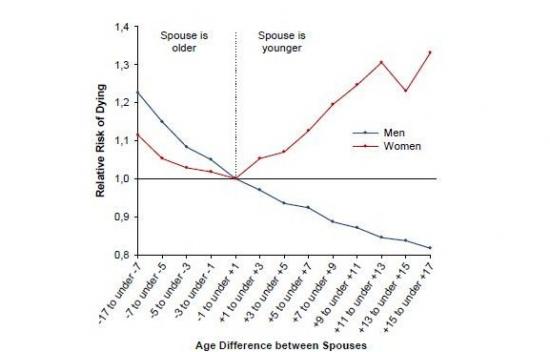Marry in haste, repent in eternity
Marry a younger woman and live longer, said a rash of headlines (Times, Daily Telegraph, Daily Mail) earlier this month. Now the story’s surfaced again (Daily Mail, today) in the form of a feature. Pretty soon, it’ll be an accepted fact that acquiring a young blonde is the route to eternal life.
Except that’s not what the original research from the Max Planck Institute for Demographic Research in Rostock, Germany, actually showed. It does show, using data from all married couples in Denmark aged 50 and over between 1990 and 2005, that men married to women seven to nine years younger than themselves are 11 per cent less likely to die within a given period than are men married to partners of the same age. And those married to a bride 15 to 17 years their junior cut their mortality rate by 20 per cent.
But that’s a consequence of the man, not the marriage. The only men who can actually persuade women so much younger than themselves up the aisle tend to be healthy and successful, which already means that their chances of a longer than average life are high. Marrying a younger woman is a marker for good health, not the cause of it.
At least, that’s the likeliest explanation, says Sven Drefahl, a PhD student at the institute who has submitted a paper to Demography on the subject. The alternative possibility – that a devoted younger wife looks after her older husband so well she keeps him alive – cannot be wholly dismissed, but it’s less likely.
However, there is a puzzle explaining why women who marry younger men don’t gain the same advantages. They seem to live less long, at least in Denmark, and so do their spouses. (The graph summarises the data .)

Mr Drefahl doesn’t have an explanation for this, except to suggest that large deviations from the social norm (a husband much younger than his wife) have a negative influence on life expectancy. That strikes me as hand-waving. Anybody got a better idea?
It could be the simple opposite of the “older husband, younger wife” scenario, in which women who don’t marry until they are older are less healthy and successful – or less attractive, to put it brutally - and that the same applies to men obliged to marry wives older than themselves. In that case, this kind of union would be a marker for the ill health of both partners.
Mr Drefahl was surprised by the way the study was reported. “For us the main finding is the different pattern in women, which we cannot sufficiently explain” he says.



